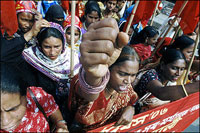International Women’s Day
From Asia to Latin America, marchers decry imperialism
By
Kathy Durkin
Published Mar 13, 2006 10:35 PM
The reactionary policies of the U.S. government
on globalization, family plan ning, war and the environment are repudiated by
women worldwide. But that didn’t stop President George W. Bush from
proclaiming on International Women’s Day, March 8, that his administration
is advancing “the equality of women in the world’s newest
democracies.”
|
Bangladeshi women in Dhaka.
|
The imperialists can lie about this day, but women the
world over know its essence is fightback—and
solidarity.
International Women’s Day this year was celebrated
especially in those parts of the world where political consciousness against
imperialism is high.
In many demonstrations throughout the Philippines,
the strength, courage and determination of women was evident. Defying President
Gloria Macapagal-Arroyo’s U.S.-backed regime, which had declared a
“state of emergency,” they organized over 30 nationally-coordinated
protests.
Women simultaneously marched in Northern Luzon, Quezon, the
Visayas islands, Mindanao and other areas, carrying colorful banners saying
“Assert women’s rights! Stop political repression, persecution and
poverty,” and “Never again to martial law.”
They
vehemently demanded the ouster of the president. During her term, the conditions
of women workers and peasants have deteriorated and the feminization of poverty
has grown. Mass unemployment is forcing women to emigrate for jobs, where they
are often mistreated. Arroyo hasn’t supported reproductive rights and
family planning programs nor has she sought justice for a Filipina woman
gang-raped by U.S. Marines last year.
In a major, militant, political
demon stration in Makati, Manila’s financial district, 12,000 women from
many organizations, leftists, working and poor people vehemently demanded,
“Oust Gloria Arroyo.” Riot police attacked this march, arresting key
leaders.
Demonstrators also targeted the U.S. military presence in their
country and the resultant sexual trafficking and abuse. Objecting to joint
U.S.-Philippine war games, women marched to the U.S. Embassy in Manila, where
they demanded that U.S. troops leave.
In Latin America, Venezuelan women
led thousands in a militant anti-imperialist procession to the U.S. Embassy. A
truckload of petitions with 2 million signatures called for the U.S. to leave
Iraq now. Armed with Venezuelan flags, President Hugo Chávez’s
photograph, and posters decrying Bush, they demanded the imperialists leave
Iraq and the U.S. close its base in Guantanamo, Cuba. “We women want
peace,” they said.
Nicaraguan women marched to the U.S. Embassy in
Managua with the same message, which was also seen on banners in Sao Paulo,
Brazil.
Also in Brazil, 500 women occupied the Roca de la Raposa ranch on
IWD. Mem bers of the Brazilian Landless Rural Workers’ Movement, they
demanded land reforms and property for women.
Women, Indigenous
people’s groups and farmers marched in Bolivia, Guate mala, Mexico,
Paraguay and elsewhere, demanding full rights.
The Cuban Women’s
Federation (FMC) protested the U.S. occupation of Iraq with a march through
Havana to the Jose Marti Anti-Imperialist Tribunal near the U.S. Interests
Section. The FMC also condemned U.S. aggression against Cuba and the unjust
imprisonment of the Cuban Five. They cheered on socialist Cuba’s economic
advances and the large proportion of women—57 percent—who have
participated in Cuba’s internationalist missions, from Venezuela to
Pakistan.
Another anti-war march, with over 2,000 women, took place in
Cuba’s Eastern province of Holguin.
The South African government
commemorated International Women’s Day in Cape Town by launching a
campaign to mark the 50th anniversary of the monumental 1956 women’s march
in Pretoria against the hated apartheid pass system. Tribute was paid to women
leaders in the historic South African liberation movement.
In Bangladesh,
thousands of garment workers and other women marched in Dhaka for the right to
decent wages, safe working conditions, and an end to anti-woman violence. Of the
country’s 2 million garment workers, 85 percent are women. The industry
brings in $6 billion in exports annually. Safety is compromised in the rush to
profits—a recent fire at the KTS garment factory in Chittagong caused 56
deaths.
Women in Seoul, South Korea, pushed for workers’ rights and
better working conditions at an anti-government demonstration. Pakistani women
rallied in many cities for an end to discrimination and sexual violence.
Indonesian women in Ache protested state repression, while Nepalese women
marched for equality, democracy and trade union rights.
When European
women socialists proclaimed International Women’s Day in 1910, they
recognized the need for worldwide solidarity with working women’s
struggles. This is especially important today in those countries that are under
U.S.-backed occupation: Iraq, Haiti, Palestine and Afghanistan.
Today the
socialist legacy of IWD is vital as women deal with capitalist inequality,
poverty and oppression. Socialism is needed to truly emancipate women.
Articles copyright 1995-2012 Workers World.
Verbatim copying and distribution of this entire article is permitted in any medium without royalty provided this notice is preserved.
Workers World, 55 W. 17 St., NY, NY 10011
Email:
[email protected]
Subscribe
[email protected]
Support independent news
DONATE


